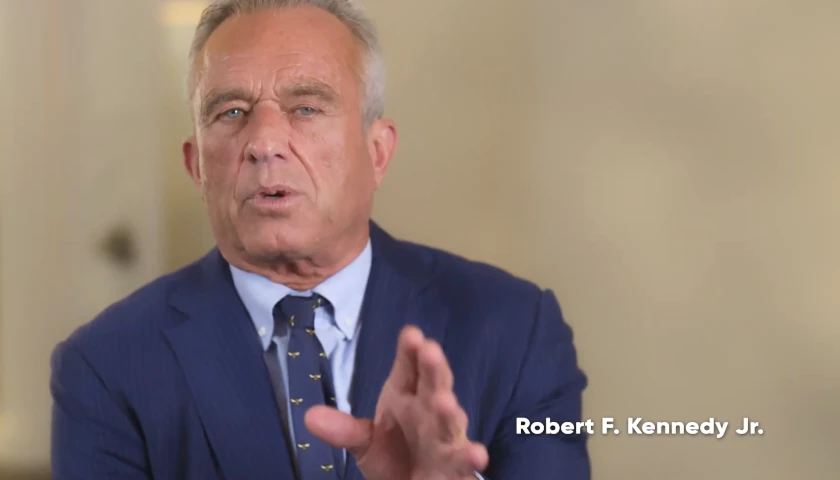Pennsylvania House State Government Committee Chairman Seth Grove (R-York) released a report Tuesday detailing “a myriad of election issues” in the Keystone State.
Speaking to reporters at the Capitol Building, Grove reviewed his findings, including inconsistent vote-counting rules, ballot harvesting, fraud and administrative errors. The new report is the third he has issued concerning election problems since November 2020.
“To date, our elections have been anything but smooth,” Grove said. “This report highlights repeated election failures which have been categorized as ‘smooth’ elections by [Democratic Gov. Tom Wolf’s] secretaries of state.”
One matter discussed at length is the inconsistency with which county election boards have treated absentee ballots on which voters failed to write the date. Beginning in the fall of 2020, courts have issued numerous conflicting rulings as to whether such votes can be counted despite state law requiring voters to date the declaration envelopes into which those ballots are inserted.
In this year’s close Republican primary for U.S. Senate, attorneys for candidate Dave McCormick argued in Pennsylvania Commonwealth Court for counting undated ballots and lawyers for eventual GOP nominee Mehmet Oz opposed it. The court ruled in favor of counting them, though they did not affect Oz’s victory. In a related case, the Third Circuit Court of Appeals issued a ruling requiring undated ballots to be counted in a race for Lehigh County Court of Common Pleas, deciding the election in favor of Democrat Zachary Cohen against Republican David Ritter.
Nonetheless, controversy around whether undated ballots will be tallied in the future continues. Although the Democrat-controlled Pennsylvania Department of State instructed counties to count the ballots, Republican-run Berks, Lancaster, and Fayette counties have insisted on rejecting the undated ballots because they contradict state law. The 2022 Pennsylvania primary results therefore remain uncertified two months after they occurred.
Elsewhere in his report, Grove writes about numerous alleged incidents of illegal voting, including ballot harvesting as evidenced by video footage. Ballot harvesting refers to one individual depositing multiple absentee ballots into mailboxes or drop-boxes, something generally disallowed under commonwealth law except in instances where sick or injured voters live in the same household.
The representative also noted two cases of voter fraud. One concerned former Philadelphia Democratic Congressman Michael “Ozzie” Myers, who admitted to engaging in bribery and conspiracy to manipulate votes in Philadelphia over five election cycles beginning in 2014. Another case pertained to a Luzerne County man who applied for an absentee ballot in 2021 using his deceased mother’s identity.
And Grove catalogues many moments of administrative failure, as when Clearfield, Delaware, Lebanon and York counties had too few paper ballots for all voters who showed up to the polls in the May 2021 primary; or when Fayette and Luzerne counties experienced equipment problems on that day; or when Montgomery County had to delay counting 23,000 mail-in ballots because of misprints and scanning issues that autumn.
In his remarks on his report, Grove did happily note that Wolf recently signed legislation to increase the number of ballots sent to counties to prevent future shortages. He also expressed cautious optimism about a measure Wolf approved that bans private entities from issuing grants to counties for election administration, a practice he believes was subject to partisan manipulation in 2020. The bill prohibiting such grants institutes a state program to meet counties’ election-funding needs, but Grove said he is worried about possible political manipulation of those public funds as well.
As for the future, Grove is urging numerous reforms including a voter identification requirement and strengthened security measures at drop boxes. On June 30, 2021, Wolf vetoed legislation to accomplish those and other changes.
Grove therefore said he hopes to get several election reforms approved via constitutional amendment. Those include a voter-ID requirement, regular election audits performed by the auditor general, and abolition of lieutenant-governor primaries. To become part of the state constitution, those measures must pass the General Assembly in two consecutive sessions and gain a majority of voters’ approval as ballot questions.
“It is July; the reality of any major election reforms passing during a major election year with few session days in the fall has dwindled to near-impossible,” the representative said. “This is why the House and Senate Republicans put a priority on constitutional amendments. We are taking our case to the people of Pennsylvania.”
Wolf’s press office did not return a call for comment.
– – –
Bradley Vasoli is managing editor of The Pennsylvania Daily Star. Follow Brad on Twitter at @BVasoli. Email tips to [email protected].









